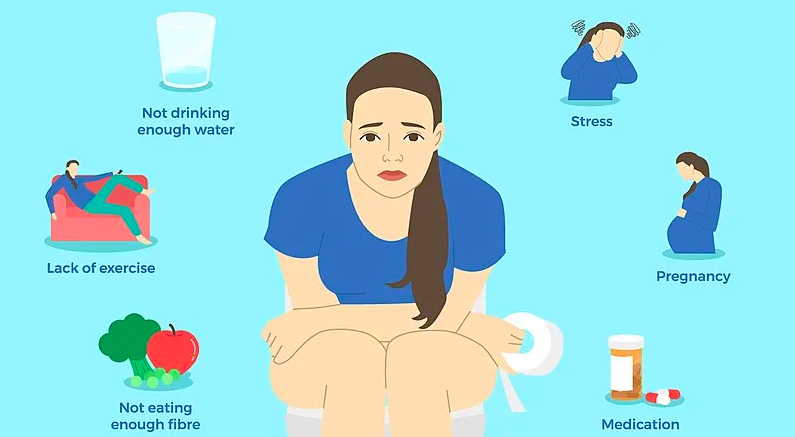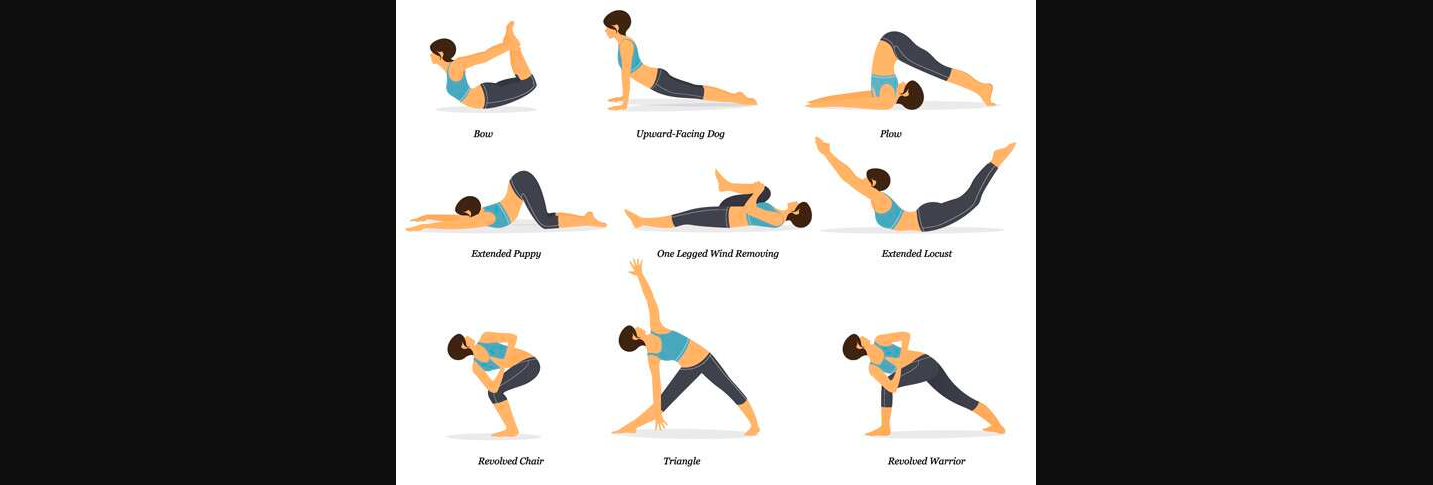Many serious diseases have their roots in constipation. According to Ayurveda, if your stomach is in good shape, no disease can affect you. Thus, maintaining good stomach health is crucial. Overtime, constipation can develop into a serious condition known as piles. Additionally, it contributes to heartburn, acid reflux, mouth ulcers, acne, and acidity.
What is constipation?
When bowel movements are infrequent or difficult to pass, it is common to experience constipation. Fewer than three bowel movements per week are possible when someone suffers from constipation. Constipation can result in bloating and pain.
As long as the pattern is consistent and you aren’t straying too far from it, your bowel movement pattern is usually particular to you and normal. Whatever your bowel pattern, the following are the main signs and symptoms of constipation:
- Most of the time, your stools are dry and hard.
- You are having a painful, challenging time passing your bowel movement.
- You don’t feel as though your bowels are not completely empty.
Causes of Constipation
Constipation can arise for a number of reasons, including:
- foods low in fibre.
- lowering water intake.
- Lack of physical activity, such as less exercise
- alterations to the daily schedule, such as travelling, eating, or sleeping at different times.
- consuming a lot of dairy products.
- Stress.
- resisted the urge to go to the toilet.

Additionally, more serious medical conditions like IBS, Crohn’s disease, celiac disease, bowel syndrome, or colorectal cancer may all show symptoms of constipation. To rule out any underlying medical conditions, you must see your doctor if you have persistent constipation.
Constipation: Symptoms
- Three bowel movements maximum per week.
- Stools are hard, dry, and lumpy.
- Stools are uncomfortable or difficult to pass.
- cramps or stomach pain occasionally.
- Frequent bloating
- Feeling Nauseous
- Feeling like your bowels are not completely empty.
How Many Stages of Constipation Are There?
Constipation can occur in various stages, and each stage necessitates a unique approach to treatment.
- Normal-transit constipation: Constipation enters this stage when there are few bowel movements (less than three per week). At this point, the goal of treatment should be to have more frequent bowel movements. You can achieve this by making sure you get enough fluids, eat a diet high in fibre, and take over-the-counter laxatives or stool softeners.
- Slow-transit constipation: One experiences hard stools and difficulty passing the stools during this stage. This brings about ailments like irritable bowel syndrome or an obstruction in the intestine. Treatment at this point should concentrate on softening the stools to facilitate easier passage. Use stool softeners, laxatives, enemas, or suppositories for this.
- Defecation disorders: When one is unable to pass a bowel movement, they are in the third stage of constipation. Obstipation is a condition that can be brought on by serious conditions like spinal cord injury or rectal cancer. At this point, treatment options could involve hospitalisation, manual stoma removal, enemas, suppositories, or even surgery.
Ayurveda’s Function in Treating Constipation
- Three distinct doshas, or types of energy at work in the body, are described by ayurveda. Each person has all three doshas, but typically one is more dominant. A person’s physical attributes, personality traits, and health vulnerabilities are all reflections of their dominant dosha.
- Vata (air)
- Pitta (fire)
- Kapha (earth).
- Constipation is regarded as a “Vata” disorder in Ayurvedic medicine, meaning that an imbalance of the air element is what causes it.
- Vata types have dry, hard stools that are challenging to pass, making them more prone to constipation. The ayurvedic remedy, which contains herbs and oils that will lubricate and soften the stool, is the most effective way to treat Vata constipation.
Ayurvedic Medicine For Constipation
1. Triphala

One of the safest and most reliable treatments for constipation is triphala. It is made with Amalaki, Haritaki, and Bibhitaki, three essential herbs that are all known to relieve constipation. It does not cause cramping or bloating, in contrast to other laxatives. Make a tea using triphala by combining it with hot water.
2. Senna
Senna is a herb that has long been used in Ayurvedic medicine. Constipation relief typically occurs within 6 to 12 hours thanks to the herb’s constituents, which stimulate the lining of the bowel. When taking senna, some people may get stomachaches and diarrhoea. You may experience a number of symptoms, such as fatigue, muscle cramps, and heart palpitations, when your body is deficient in potassium.
3. Ghee with milk
It is one of the most traditional and efficient treatments for constipation. Consuming cow’s ghee with milk has long been thought to improve gut health, ease bowel movements, and provide the body with a nutritious source of fat. Before going to bed, consume 1 cup of hot milk with 1 tablespoon of ghee to ease constipation.
Amazing Cow Ghee Benefits You May Not Have Known!
4. Castor oil

As a natural laxative, castor oil is effective. Castor oil is thought to have the capacity and strength to treat constipation with ease. It can easily stimulate the intestine’s function. Castor oil, 10 drops daily on an empty stomach, facilitates simple bowel movements. Within five hours of eating, one passes the stool.
What is Castor oil? Interesting Arandi Oil Uses and more
5. Hot water
One of the best ways to remove toxins from the body is to drink hot water first thing in the morning. As soon as you get out of bed, slowly drink at least 2-3 glasses of hot water to encourage easy bowel movements. It is believed that if a person drinks two glasses of hot water every day in the morning, constipation will not affect them.
6. Haritaki, Ghee & Honey
All three of these ingredients should be consumed in warm milk before bed. One of the herbs found in Triphala, Haritaki, is renowned for lowering Vata and aiding in the treatment of constipation. Haritaki also has a number of other health advantages.Haritaki aids in quick healing and encourages simple bowel movements when taken with milk and ghee.
7. Sunthi

Indian cuisine frequently uses the spice sunthi, also known as dried ginger. It is known as a therapeutic herb in Ayurvedic medicine, where it is thought to aid in the treatment of constipation and other digestive problems. According to legend, sunthi aids in boosting the metabolism and encouraging regular bowel movements. It is believed to function by enhancing peristalsis and producing more stomach acid.
8. Liquorice Root
A safe and efficient Ayurvedic treatment for constipation is liquorice root. It has a laxative effect and might make stools softer. In order to lubricate the intestine and facilitate stool passage, it is also known to stimulate the production of mucus. Health food stores sell licorice root in powder or capsule form. Small doses are typically regarded as safe when using it.
Ayurvedic Medicines’ Benefits in Treating Constipation
Ayurvedic medications have many advantages for treating constipation. The following are some of the main advantages:
- Ayurvedic medications aid in enhancing intestine motility, facilitating stool passage.
- They improve intestinal muscles’ tone and strength, which helps to prevent constipation.
- Natural laxative herbs are a component of Ayurvedic medicines, which relieve constipation.
- They also support better nutrient absorption from food and aid in the cleansing of the digestive system.
- Ayurvedic medications have no side effects and are secure for long-term use.
Yoga Postures for Aiding Constipation
Ayurvedic practitioners say that a few yoga poses to encourage bowel movement and relieve constipation. The poses consist of:
- bhujanghasana (Cobra)
- ardha matsyendrasana (Half Spine Twist)
- trikonasana (Triangle Stretch)
- dhanurasana (Bow)
- supta vajrasana (Sleeping Pelvis)
- vajrasana (Diamond)
- naukasana (Boat)
- sarvangasana (Shoulder Stand)
- mayurasana (Peacock)
- mandukasana (Frog)
- halasana (Plow)
- shalabhasana (Locust)
- katichakrasana (Standing Spine Twist)
- paschimottanasana (Head to Knee)

Yoga is always advantageous; doing it every morning keeps one healthy, active, and disease-free. Always follow instructions of an expert.
Lifestyle Changes to treat Constipation
To treat constipation, Ayurveda suggests a number of lifestyle modifications and herbal treatments. The following actions can be taken to treat Vata dosha-related constipation.
- Ensure that you are getting enough water. The ideal number of glasses per day is 6–8.
- Avoiding processed foods, alcohol, and caffeine will also be beneficial.
- eating a diet that is simple to digest, which includes soups, whole grains, fruits, and vegetables.
- doing regular exercise.
- practising meditation or yoga.
What is Barley Rice? Its Amazing Health Benefits and more
When to See a Doctor?
It is critical to see a doctor if you exhibit any symptoms of constipation that persists for more than a week or any of the following signs:
- Abdominal pain
- bodily bleeding
- the inability to urinate despite several days of attempting
- nausea or diarrhoea
- alteration of appetite or loss of weight
- recurring diarrhoea for longer than two weeks
Additionally, consider whether you have any underlying medical issues that might be causing your constipation.
Additionally, suppose you have any underlying health conditions that could be contributing to your constipation (such as hypothyroidism, diabetes, etc.). Your doctor can advise you on the best course of action.
The Bottom Line
Numerous unpleasantnesses result from constipation. People become dependent on pills for simple bowel movements, which is a short-term cure for the illness. You can treat constipation effectively with ayurvedic medications. They function by energising the digestive system and facilitating faster passage of food through the intestines. Ayurveda is a holistic system of medicine that treats the whole person in addition to the disease’s symptoms. You can have your choice of ayurvedic treatment to meet your health requirements.
While these Ayurvedic remedies for constipation are effective, speak with an Ayurvedic doctor about which herbs and supplements would be most beneficial for you.
Read more:
दमा (अस्थमा) और सरल घरेलू उपचार के लिए आयुर्वेदिक दवा
मधुमेह के लिए आयुर्वेदिक चिकित्सा | Diabetes in Hindi





